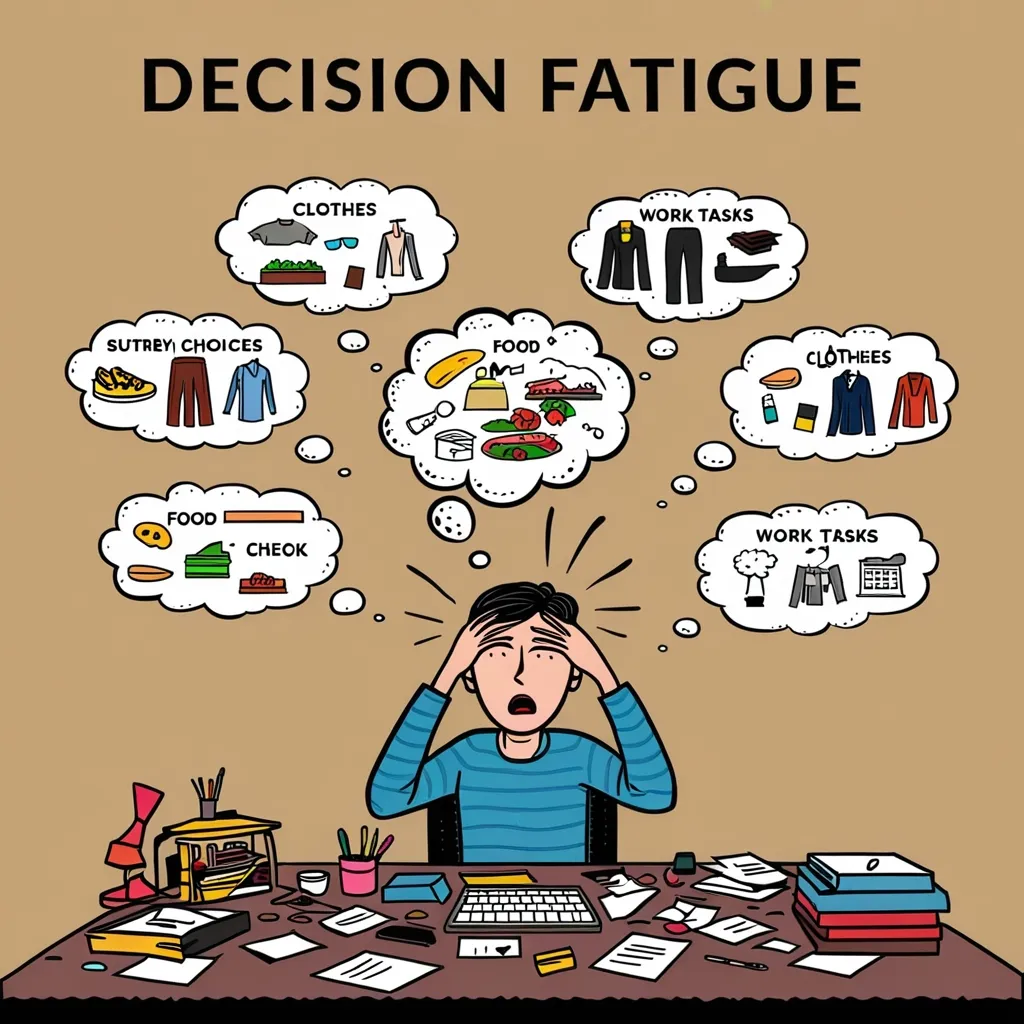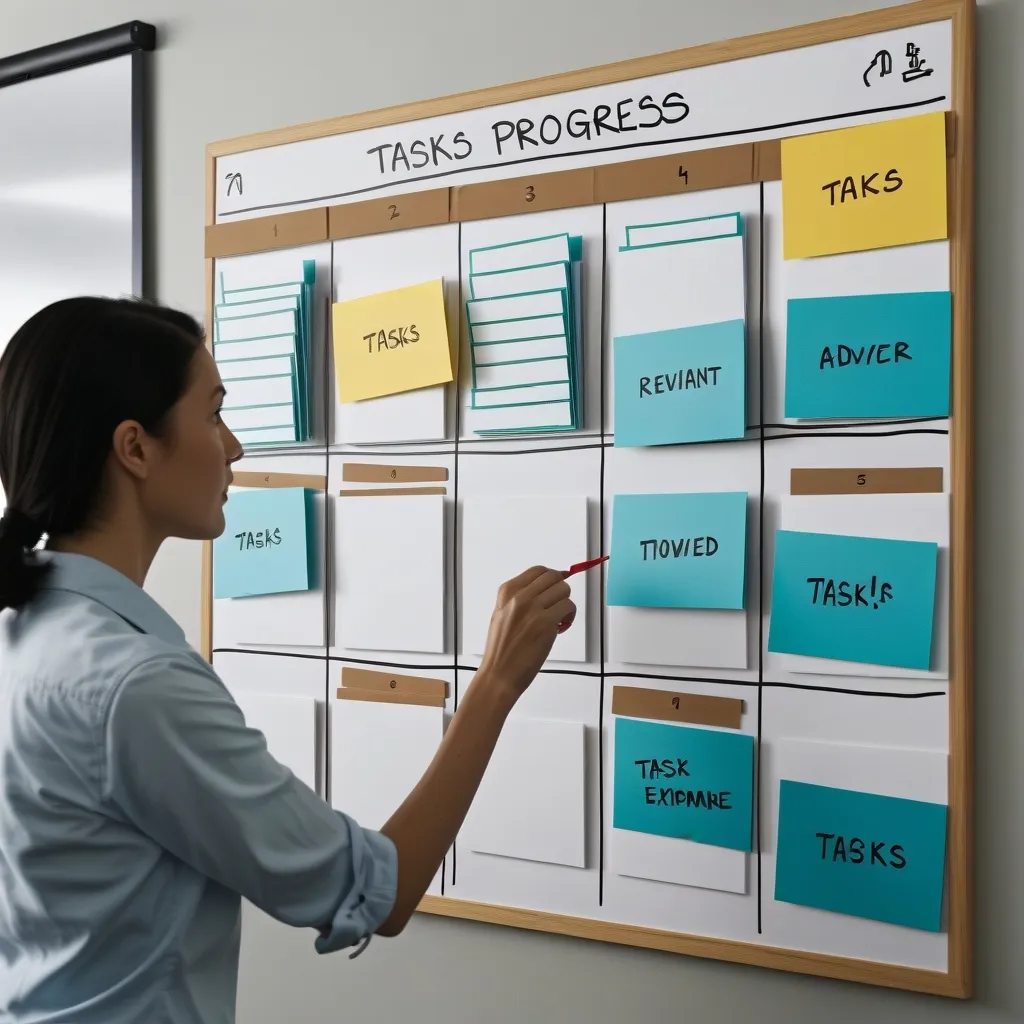Decision fatigue—it’s something that creeps into everyone’s lives, no matter how sharp or rational you are. You know that brain drain you feel after a long day of making choices? That’s exactly what we’re talking about. Making too many decisions can leave you feeling burned out and lead to poorer choices. So, let’s take a closer look at what decision fatigue really is and how to kick it to the curb.
The Basics of Decision Fatigue
Think of your brain as a battery that powers down with every decision you make. The more choices you face, the more your brain’s battery depletes. This concept, often called “ego depletion,” suggests that there’s only so much decision-making energy you have before it runs out.
Surprisingly, it’s not just about those big, life-changing decisions. Even the little ones, like picking out your morning outfit or deciding what to eat for breakfast, chip away at your mental resources. Imagine starting your day deciding on clothes, breakfast, and finding your way to work—you’re already using up some of your decision-making energy before you’ve even started your actual day.
Real-Life Heroes
Take a leaf out of the books of some smart folks like Barack Obama, Steve Jobs, and Mark Zuckerberg. They knew a thing or two about decision fatigue. Their trick? Simplifying their wardrobes by wearing the same outfits every day. By cutting down on these trivial choices, they saved their brain power for the stuff that really mattered.
How It Drains You
Decision fatigue can mess with your head more than you realize. One big problem? It tanks the quality of your decisions. When faced with too many choices, our brains go into energy-saving mode, relying on shortcuts that often lead to irrational or even downright bad decisions.
Take judges, for example. Studies have shown that judges tend to be more lenient in their decisions earlier in the day. As the day wears on and decision fatigue sets in, they become stricter—not because they’re getting stricter, but because their brains are too tired to process decisions well.
Beating Decision Fatigue
Wondering how to keep your brain battery charged? Here are a few tried-and-true ways to keep decision fatigue at bay:
Simplify That Wardrobe
Why not follow in the footsteps of Obama, Jobs, and Zuckerberg? Simplify what you wear every day. If your closet is filled with similar outfits, you cut out the need to think about what to wear, saving that precious brain power for more significant decisions.
Routines Are Your Friend
Building routines can be a total game-changer. Set specific times for daily activities like exercising, doing chores, or even when to have your meals. This way, you’re not making decisions about when to do these things—they’re already set in stone, letting you reserve mental energy for other tasks.
Keep Those Glucose Levels Steady
Stable glucose levels can help keep decision fatigue at bay. Keeping your energy up by eating regular meals and having snacks throughout the day keeps your brain in tip-top shape. Notably, making important decisions right after eating can help, too, since your brain will be more alert.
Important Decisions First
Tackle your most critical decisions when your brain is fresh—ideally, early in the day. This strategy ensures that when decision fatigue sets in later, you’ve already taken care of the most important stuff. Got a nerve-wracking phone call to make or a challenging project to dive into? Do it first thing in the morning.
Cut Out Distractions
Minimizing distractions can significantly help, too. Try to avoid social media, emails, or TV during work hours. These distractions can zap your mental energy, making it harder to focus on what really matters.
Don’t Underestimate Rest
Rest is a biggie for keeping mental energy up. Taking breaks during the day and getting enough sleep at night helps you recover from the mental strain of decision-making. A well-rested mind can tackle decisions with better clarity and judgment.
Beyond the Individual
Decision fatigue isn’t just a personal problem. It can have ripple effects on entire organizations and societies. Companies, for example, might introduce shorter workdays or four-day work weeks to lessen the mental strain on employees. When people are less mentally exhausted, their decision-making quality can vastly improve, reducing the risk of burnout.
Culture and Personality Matter
Did you know that decision fatigue can vary among different cultures and individual personalities? Research suggests that people in Western cultures might be more susceptible to decision fatigue compared to those in Eastern cultures, where the belief in the energizing power of willpower can provide a buffer against it.
Practical Tips for Everyday Life
Grasping decision fatigue can totally help you make better choices daily. Here are some more down-to-earth strategies you can apply:
Automate Repetitive Decisions
Automate whatever you can. Set up automatic payments for bills or plan your meals for the week. This reduces the number of repetitive decisions you need to make, leaving your mind free for other things.
Plan Ahead
Plan your day the night before. Decide on what you’ll wear, what you’ll eat, and how you’ll spend your time. This way, you start the day with a clear roadmap, reducing the number of decisions you have to make on the fly.
Batch Similar Tasks
Group similar tasks together. For instance, check and respond to all your emails at once instead of periodically throughout the day. This practice helps cut down on the mental effort required to switch between different types of tasks.
Implementing these simple strategies can help you cut down on the number of decisions you face each day, significantly reducing the impact of decision fatigue.
Wrapping It Up
Decision fatigue is a tough nut that every one of us has to crack. Yet, by understanding what causes it and adopting strategies to reduce the number of decisions we need to make, we can maintain our mental health and improve the quality of our choices. From simplifying your wardrobe to planning ahead and minimizing distractions, there are countless ways you can fight off decision fatigue. Make these changes, and watch your life become easier and more efficient, one decision at a time.






